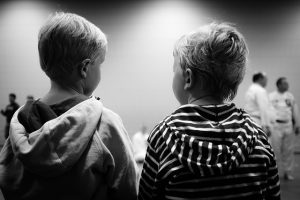As a parent, you want your child to excel and be set up for lifelong success. Early childhood education gives your child the tools they need to excel throughout their lifetime of education. You may feel ambivalent about enrolling your child into an early education program. Parental decisions are never easy, but the profound benefits of early childhood education make the decision easier.
Benefits of Early Childhood Education
Teaches Socialization

Socialization is the most obvious benefit of early childhood education. When a child attends preschool, they learn how to socialize, cooperate, share, and form friendships. They learn to communicate with other adults outside of their family. If your child learns to socialize at a young age, it will be easier for them to develop a healthy self-esteem.
Nurtures All Aspects of a Child’s Development
Early childhood education nurtures a child’s emotional, social, physical, and mental development. Teachers of early childhood education are trained to nurture each of these areas by focusing activities on them. Interaction with other children also nurtures these areas.
Sparks Motivation for Lifelong Learning
At the preschool age, a child is the most inquisitive. Preschool activities are intended to be fun and hands-on. When a child realizes that learning is fun, they will have a positive attitude about learning throughout their lifetime. They will also keep the motivation to learn.
Helps a Child Develop Respect
Early childhood education helps prevent disrespect because it teaches and promotes respect. In preschool, a child learns the value of respecting authority figures and peers. Respect is taught in preschool by enforcing manners. This includes, “Please” and “Thank you”, as well as not talking when the teacher is giving directions, and speaking to their peers in a respectful tone.
Teaches Effective Teamwork
Teamwork is a skill your child will need to have in school, recreation, and the workplace. Preschool sets the foundation to make a child an employable adult by practicing teamwork daily.
Teaches Concentration and Patience
When a child is at home, they can move from one activity to another. When they need a snack or a drink at home, they get it right away. In preschool, a child must focus on a project or an activity for the time set and allowed by the teacher. They need to wait to express their hunger, thirst, or restroom needs. This will prepare them for elementary school because they have to stay focused on their classwork and be patient.
Exposes a Child to a Variety of Different Types of People
When a child is limited to the company of family/friends, they are most likely exposed to the same type of people. When a child enters preschool, they see an array of different religions, ethnicities, and cultures. This helps teach a child the concept of tolerance early on in life.
Preschool Achievement Gap

The children who are not receiving the same quality preschool education as other children are not reaping the developmental and educational benefits. This causes an achievement gap later on between the children who attended preschool and the children who did not. The children who did not attend preschool are behind in their learning and development when they start elementary school.
Unfortunately, issues including low-income, poverty, and a lack of quality preschool program availability in certain areas play a significant role in the existence of the preschool achievement gap.
You can help close the preschool gap by taking advantage of enrolling your child into an early childhood education program. This will ensure your child is not behind when they get to kindergarten and first grade. There is trustworthy preschool in Jackson, Michigan.
The Importance of Early Childhood Education
Early childhood education is important because of the numerous short-term and long-term benefits. It introduces topics which will be taught in kindergarten and elementary school, including art, math, and language. This will give your child a strong educational foundation. Early childhood education is a complement to all the valuable skills and nurturing a child receives at home. Preschool takes what they learn at home a step further by teaching your child to apply those skills and values when working with other adults and children. Both a positive home environment and a quality preschool work together to make a child well-rounded.
Long Term Benefits of Early Childhood Education
Higher Earnings
The HighScope Perry Preschool Study remarkably showed that adults, who were enrolled in a quality early education program as young child, earned approximately $2,000 dollars more a month. This totals up to $24,000 more a year than adults who were not enrolled in a quality early education program as a child.
More Desirable to Employers
Preschool teaches skills such as teamwork, respect, cooperation, patience, and moral development. Adults who attended preschool as young children are more desirable to employers because they have had the qualities an employer is seeking from the time they were young children.
Less Likely to Commit Crimes
When a child is taught morals early on in life, they are more likely to keep them throughout life. Studies show children who attended preschool were less likely to externalize criminal behaviors such as lying, stealing, and aggression.
More Academically Motivated
According to IQ tests, children who attended a quality preschool program tended to have higher IQ scores than the children who did not. In addition, these children were more likely to graduate high school, attend college, and be more motivated about academics in general.
Longer Marriages

Adults who attended preschool as children are more likely to have longer, more successful marriages. This may be because they earn more money, are less likely to commit crimes, and are better at teamwork and communication.
Preschool vs. No Preschool Statistics
The statistics prove early childhood education has lifelong benefits on children.
• Children who did not attend preschool are 25 percent more likely to drop out of high school
• Children who did not attend preschool are 40 percent more likely to become a parent in their teenage years
• Children who did not attend preschool are 60 percent more likely to not pursue higher education
• Children who did not attend preschool are 70 percent more likely to be arrested for a violent crime
Though early education comes at a price, the price is not as high as the outcomes for the children who did not attend preschool. The numbers do not lie. They are proof that early childhood education has a significant impact on a child’s life.
Conclusion
Early childhood education is critical for a child. You do not want your child to be a part of the preschool gap, and left behind when they get to elementary school. You do not want your child’s adulthood to be negatively impacted because of not making a simple early decision to enroll them in a quality preschool. The short and long-term benefits, and the effect it has on a child’s outcome, prove that you have nothing to lose and everything to gain by enrolling your child into an early childhood education program.
Leave a Reply